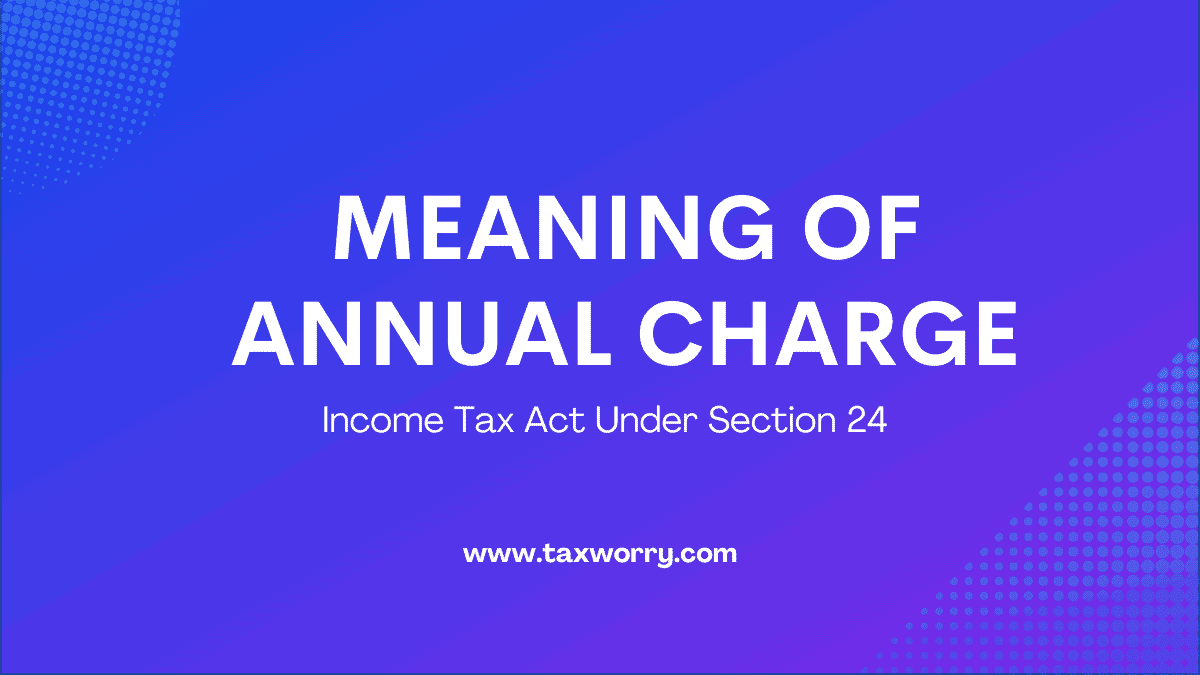Meaning of tax terms
Meaning of Annual charge
The meaning of Annual charge under section 24 of the Income Tax Act is not defined in the act itself. But we can take guidance from decisions by various high courts. Here are excerpts of courts orders in which the Hon’ble High Court tried to explain the meaning of the annual charge.

Meaning of annual charge
The phrase “annual charge” used in section 24 of the Income Tax Act came up before various high courts as detailed under :
1.Hon’ble Mumbai High Court explained the meaning of “annual charge” while delivering judgment in CIT v. S.B. Bakshi Dalip Singh [1980] 122 ITR 96 (bom.) as under :
Meaning: Though a payment is made more than once in a year, it can qualify for being called an annual payment or an annuity if in substance, the nature of the payment is such that the payment is contemplated every year or has an element of recurrence in it.
If a payment recurs over a long period of years, it can be called an annually recurring payment notwithstanding the fact that the mode of payment is monthly or the intervening period between two payments is less than a year. Thus, if any amount is payable monthly and such payment is to recur year after year, the liability must be treated as one for making an annual payment and the property which is charged with such payment must be said to be charged with an annual charge.
2. Hon’ble Kolkata High Court explained the meaning of “annual charge” while delivering judgment in CIT v. State bank of india [1957] 31 ITR 545 (cal.) as under :
Meaning: The word ‘annual’, as used in taxing statutes, must be taken to mean payments, in whatever kind of instalments paid, made every year in discharge of a liability incident to that year, if it has to be made during more than one year, whether consecutively or otherwise. A payment is annual if it has the quality of recurrence in different years, although it might not be in every one of a succession of years. It is also not necessary that its quantum should be fixed by reference to a whole year. The word ‘charge’, as used in section 9(1)(iv) of the 1922 act must mean payment and not security.
Section 24 . of Income Tax act
Deductions from income from house property.
24. Income chargeable under the head “Income from house property” shall be computed after making the following deductions, namely:—
(a) a sum equal to thirty per cent of the annual value;
79(b) where the property has been acquired, constructed, repaired, renewed or reconstructed with borrowed capital, the amount of any interest payable on such capital:
Provided that in respect of property referred to in sub-section (2) of section 23, the amount of deduction or, as the case may be, the aggregate of the amount of deduction shall not exceed thirty thousand rupees :
Provided further that where the property referred to in the first proviso is acquired or constructed with capital borrowed on or after the 1st day of April, 1999 and such acquisition or construction is completed within five years from the end of the financial year in which capital was borrowed, the amount of deduction or, as the case may be, the aggregate of the amounts of deduction under this clause shall not exceed two lakh rupees.
Explanation. – Where the property has been acquired or constructed with borrowed capital, the interest, if any, payable on such capital borrowed for the period prior to the previous year in which the property has been acquired or constructed, as reduced by any part thereof allowed as deduction under any other provision of this Act, shall be deducted under this clause in equal instalments for the said previous year and for each of the four immediately succeeding previous years:
Provided also that no deduction shall be made under the second proviso unless the assessee furnishes a certificate, from the person to whom any interest is payable on the capital borrowed, specifying the amount of interest payable by the assessee for the purpose of such acquisition or construction of the property, or, conversion of the whole or any part of the capital borrowed which remains to be repaid as a new loan.
Explanation. – For the purposes of this proviso, the expression “new loan” means the whole or any part of a loan taken by the assessee subsequent to the capital borrowed, for the purpose of repayment of such capital:
Provided also that the aggregate of the amounts of deduction under the first and second provisos shall not exceed two lakh rupees.
In this article, you can get guidance from high courts on the meaning of the annual charge under Section 24 of the Income Tax Act.
Updated up to Finance Act 2021 act under
